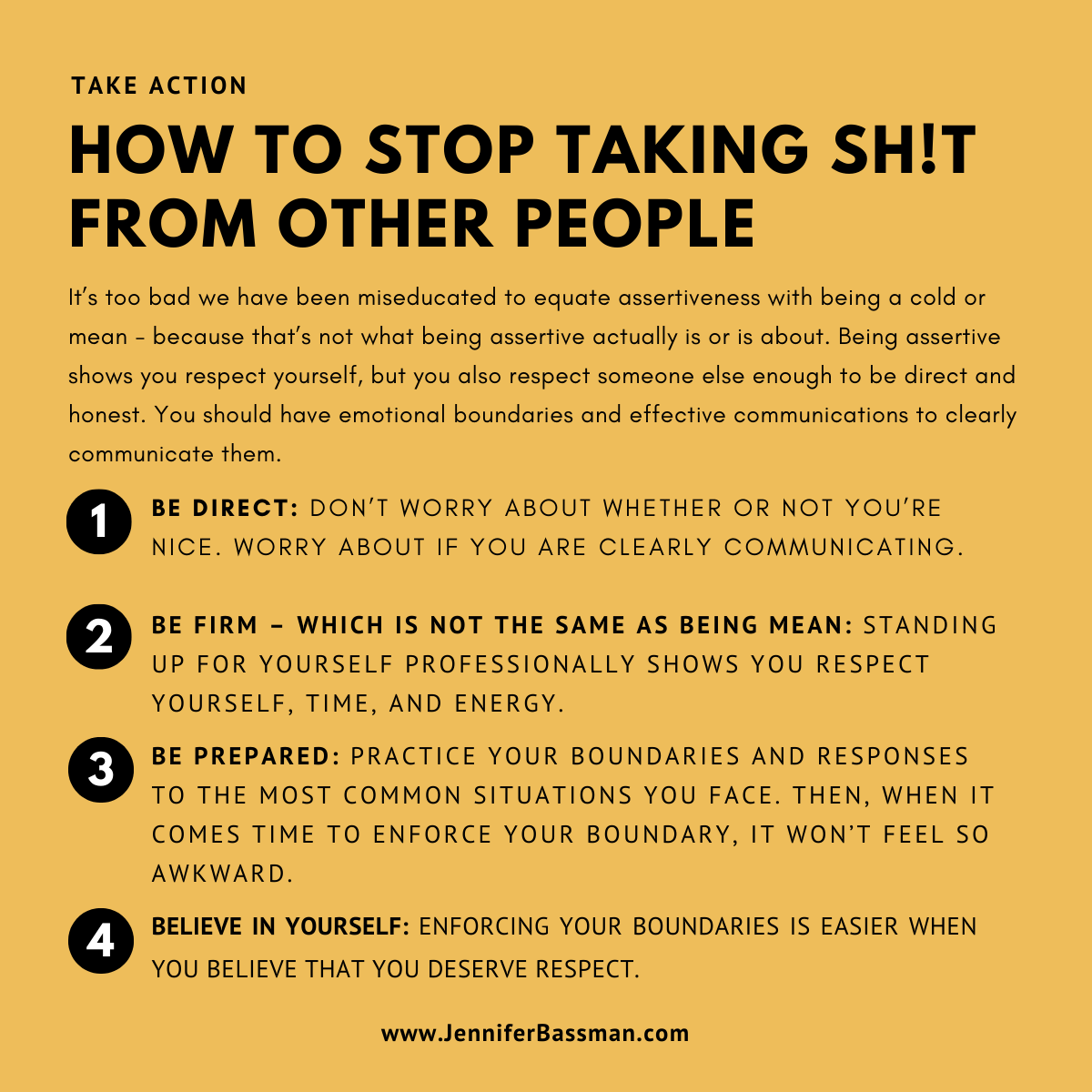I’ve got a radical concept for to add to your professional boundaries: if you stop taking shit from people, they will stop giving it.
A few weeks ago, a former petsitting client reached out because she and her dog were in town for the holidays and wanted to “get together.”
As badly as I wanted to see her pup, I knew what I was in for: this client unloading her burdens and stresses on me. Taking up hours of my time to share her trials and tribulations.
Over the years, as my client, she became an emotional vampire that sucked the life out of me when in her presence.
When she called this time, I told her I was unable to find the time to get together.
My husband was shocked because he knows how I feel about her dog.
“I said no because I don’t have the emotional bandwidth to handle her right now. I know she is going through something crappy, but I never hear from her other than when she wants something – which is usually to complain.”
I enforced an emotional boundary that I was no longer going to be an emotional punching bag for others. There is no amount of wine or chocolate that makes the long-term repercussions from this scenario any less stressful.
Each time I have enforced this emotional boundary, the guilt and stress are temporary, while the positive payoff outlasts the memory.
Ready to recover from burnout? Join my community to find out more about The Burnout Recovery Method online course.
This Is Called ‘Trauma Dumping’
Trauma Dumping comes in many shapes and forms, but it happens when someone unloads their traumatic experiences on others without warning or invitation. People do it because they need validation, attention, or sympathy.
What many of us don’t realize – especially people pleasers – is that our emotional boundaries are violated on a near daily basis in our professional lives. It’s just disguised by professional obligations and responsibilities.
For business owners and leaders who actively try to avoid taking shit from others, it is especially hard to enforce emotional boundaries without feeling or seeming insensitive or cold.
This sneaky trauma dumping could look like:
- Clients sharing their personal problems that do not relate to the work your company is being asked to perform. For example, a client is going through a divorce. A several points, she makes negative comments about her personal situation rather than remaining focused on the professional conversation.
- An employee consistently uses their one-on-one meeting times with their boss to discuss in-depth personal issues, leaving little time for work-related discussions. For example, your employee is having disciplinary issues with their child. You find yourself discussing their child’s latest problem rather than the work they have been hired to do.
- Or, someone asks for your help with a project. Instead of just asking for direct help, they tell you about a personal problem that has led to them getting behind.
In each of these scenarios, people came to you under the guise of having a professional need, but flipped the script to include oversharing their personal burdens.
It feels like this person is a bottomless pit of drama. Their overwhelm and anxiety comes out when they share strong emotions using highly-charged speech and graphic details about their situation.
Trauma dumping leaves you feeling helpless, trapped, and exhausted. Helpless because the dumper just wants to release emotion, not work through their issues. Trapped because you don’t want to seem like an unsympathetic jerk. And, exhausted because this emotional roller coaster is tiring.
You might even have some feelings of being used or feeling resentful when it’s all over.
Why You?
Trauma dumping is one of the many examples of shit we take from other people.
You’re the person that people always come to in a pinch, are notorious for “being able to do it all,” or you feel as though you’re expected to put up with people’s disrespect to keep the peace and look professional.
So, what is it about you that people feel so comfortable taking advantage of you?
Because you have shown them time and again that you are willing to put up with their bad behavior.
You say yes when you mean no.
You listen even though it hurts you or prevents you from being productive.
You look the other way to avoid conflict when someone is disrespectful.
Unconsciously the people around you notice you will sacrifice your own productivity, time, energy, and sanity to keep them happy. We all have a sixth sense that operates in our unconscious that looks out for and connects with people that will enable our toxic behaviors.
This also means people notice when you aren’t someone who takes shit from others.
It’s Not Your Responsibility
In a professional setting, I think it’s especially hard to stop taking shit from other people.
Your company and/or your career is your source of financial survival, which often can seem tenuous. Sometimes it feels if we piss off the wrong person, we could have a mess that is harder to clean up than if we just sat there and obliged another person’s bullshit.
However, for your own sanity, happiness, and professional reputation this is the worst thing you could do.
This is a big sign you’re operating from a place of fear (emotion), and will end up carrying emotional baggage that holds you back. Your fear is making you focus on the consequences rather than your abilities and accomplishments.
It’s too bad we have been miseducated to equate assertiveness with being a bitch or being mean – because that’s not what being assertive actually is or is about. Being assertive shows you respect yourself, but you also respect someone else enough to be direct and honest. You should have emotional boundaries and effective communications to clearly communicate them.
Look, either way it’s a risk if you do or you don’t take other people’s shit.
So, you need to decide which risk has a healthier outcome for you and your business.
TAKE ACTION: How to Stop Taking Shit from Other People
Some things are easier said than done. Standing up for yourself and cutting people off initially may feel unsympathetic or mean. However, part of being a leader is showing your strength and decisiveness. Not everyone is going to like every decision or response, but that’s not up to you to regulate.
- Be direct: Don’t worry about whether or not you’re nice. Worry about if you are clearly communicating.
- Be firm – which is not the same as being mean: Standing up for yourself professionally shows you respect yourself, time, and energy.
- Use silence: When you can clearly see someone is trying to take advantage of you, taking a cheap shot at your work because of your response – remain silent. Silence destabilizes the other person because they are expecting you to defend yourself or argue.
- Be prepared: Ask yourself what you want the outcome to be in situations where people expect too much from you. Then, prepare a few responses that communicate your needs or point clearly.
- Believe in yourself: Enforcing your boundaries is easier when you believe that you deserve respect.
- Role-play: Ask a trusted colleague or a friend to role-play you pushing back. Ask them to help you with your tone and body language so that it appears more neutral.
- Screw social media and online reviews: The internet has made us crazy. Negative social media or negative online reviews don’t pack the punch you think they do.






